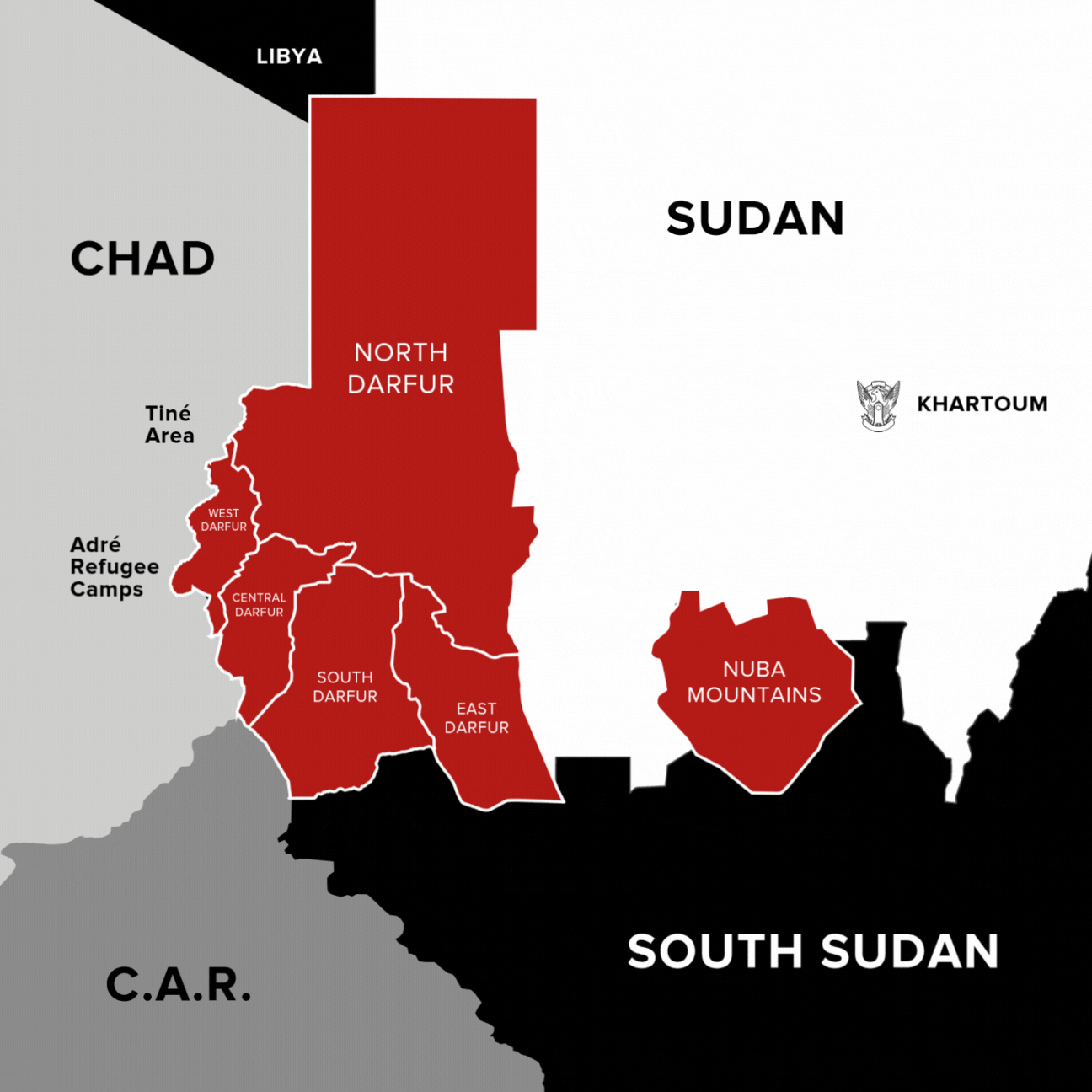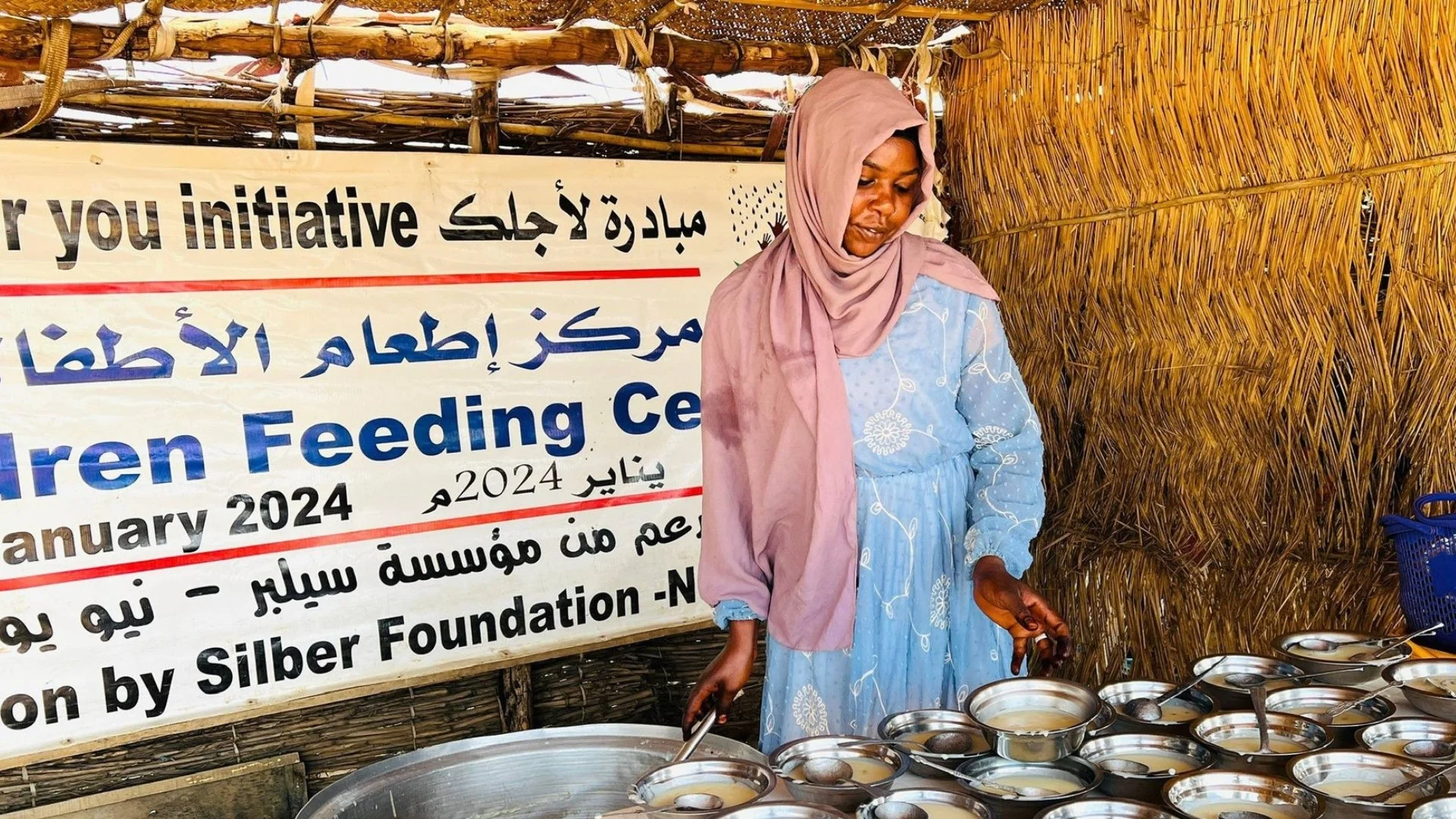Adré Children’s Feeding Program and Clinic Update - October 2025
Program Background
When war erupted in Sudan in April 2023, Darfur quickly became the epicenter of some of the conflict’s worst atrocities. What began as a power struggle between Sudan’s military and the paramilitary Rapid Support Forces (RSF) spiraled into a brutal, targeted campaign of violence. The largely Arab RSF launched a hate-driven assault on Darfur’s historic ethnic African communities, including the Zaghawa, Fur, and Masalit people groups.
Map by Operation Broken Silence
Parts of Darfur are now in famine. Refugees crossing the border into Adré, with nothing but the clothes on their backs and thousand-yard stares, tell stories of mass killings and starvation. Darfur has descended into ethnic cleansing, widespread rape, and total lawlessness under RSF occupation. Markets, farms, banks, and aid warehouses have been looted or destroyed.
In response, Operation Broken Silence is helping local heroes deliver emergency food and medical care to some of the most vulnerable refugee communities in eastern Chad. We’re supporting trusted Sudanese community leaders in two key areas:
The Adré refugee camps
The Tiné area
Below are important updates from the Children’s Feeding Center and Healthcare Clinic in Adré—both of which are refugee-led and privately funded by people like you.
October Overview
Since July 2025, all departments and activities associated with the clinic have been struggling due to a lack of funding, which has hindered our ability to meet patients’ needs and feed the children. But October was unlike previous months.
This month’s improvement and relative stability in service delivery were made possible thanks to gifts from the Silber Foundation and people like you who give and fundraise on our behalf. These contributions enabled clinic staff to:
Increase the daily patient visits by approximately 34% compared to previous months.
Introduce a new meal at the feeding center consisting of rice and dried vegetables.
Resume all previously suspended medical tests due to the availability of necessary supplies.
Launch the Pink October campaign, raising awareness about breast cancer.
Provide several medications in the medical counseling room that had previously been unavailable.
With the end of the rainy season, starting November 2025, malaria cases are expected to decline, although it will likely remain the most prevalent disease. Meanwhile, respiratory illnesses, anemia, and eye diseases are expected to rise with the onset of winter.
Photos: Life at the Clinic in Adré
The clinic continue providing critical health services to Sudanese refugees despite ongoing challenges such as minimal funding and not having enough basic medicines and medical consumables, in addition to increasing pressure with the spread of seasonal diseases. Here’s a snapshot from the month of October:
Number of patient visits: 2,726
Number of disease occurrences: 4,217
Most frequent diseases: Malaria, respiratory illnesses, urinary tract infections, digestive disorders, eye diseases.
Departmental Activities
1. Medical Counseling Room – General Practitioner
Received 1,334 patients, marking a 9% increase compared to September.
Patient demographics: Women: 41%, Children: 35% and Men: 24%
Total disease occurrences: 2,825, averaging two conditions per patient.
Most frequent diseases: Malaria, Respiratory illnesses, Urinary tract infections, Digestive disorders and Eye diseases.
2. Chronic Diseases Clinic
Treated 644 patients, a 6% decrease from September. All medications, tests, and counseling services were available.
Notable increase in consumption of Amilo-5 (blood pressure medication) due to a rise in patients requiring it.
3. Obstetrics and Gynecology Clinic
Served 60 female patients, a 28% increase from September.
Provided consultations and medical care for women’s health and pregnancy.
A significant increase in patient numbers is expected following the addition of a new OBGYN specialist to the clinic team.
4. Emergency & Short-Stay Department
Handled 391 emergency cases, a 4% decrease from September due to the decline in malaria cases. However, cerebral malaria remained the most critical emergency condition.
Other common emergencies included bleeding and shortness of breath, which are expected to persist with the onset of winter.
5. Nursing & Minor Procedures Department
Treated 297 patients, a 17.5% decrease compared to September.
Most cases involved medication administration, wound care, and minor surgical procedures. All necessary medical supplies were available.
The decline in patient visits is attributed to the end of the rainy season, which typically sees a rise in wounds and seasonal skin infections.
6. Laboratory Department
Served 1,243 patients and conducted 2,198 tests in October — a 56.5% increase from September. This surge followed the resumption of several tests that had been suspended due to funding shortages. Most common tests: Malaria, Urinalysis, Blood glucose, Hemoglobin and Typhoid.
7. Guidance & Awareness Department
Conducted 13 group sessions for clinic visitors and 40 individual sessions for those needing personal support. Main topics covered included breast cancer awareness and personal hygiene and cleanliness.
Photos: Breast cancer awareness event
8. Media & Public Relations Department
Published weekly reports consistently and expanded the photo and video archive.
Collaborated with the Health Education Department to support awareness sessions and produce educational materials.
Welcomed several delegations in October, including: the Clinic Support Committee, the General Director of Al-Hikma Medical Center, and a delegation from Pulse of Life Clinic. These visitors reviewed clinic operations and donated significant quantities of medications.
The department also coordinated with the community leaders of Adré Camp to explore ways of inviting the World Food Programme (WFP) to visit the children's feeding center, aiming to secure monthly food rations aligned with refugee food distributions.
9. Training Department
Conducted 3 discussion sessions on various medical topics for clinic staff.
The department also monitored the performance of trainees working in the clinic.
10. Feeding Center
Served 7,149 meals to children, nearly matching the number served in September.
Additionally, 1,450 meals were provided to staff, patients, and caregivers.
The center requires maintenance following the rainy season.
Photos: Life at the feeding center in Adré
11. Workforce
After a shortage of doctors and lab technicians in late September:
A new general practitioner, Dr. Mariam Bashir, joined the clinic.
A malaria technician, Mr. Al-Hafiz Mohamed, joined the laboratory team.
Starting Monday, November 3, a new OBGYN specialist, Dr. Muawiya, will join the Obstetrics and Gynecology Clinic.
12. Repairs Needed
During the rainy season, parts of the clinic sustained damage, including the feeding center’s facade, outer fences, patient waiting shelters, and benches. Post-rainy season, urgent maintenance is needed to prevent further damage from intense sunlight.
Current conditions in Adré
The situation Sudanese refugees face in eastern Chad is a protracted humanitarian emergency. People fleeing ethnic cleansing and famine face hunger and disease after arriving at one of the 30+ informal border crossings, many having walked for days carrying only what they could, including mothers and children weakened by hunger and trauma. The scale of this crisis is staggering:
The number of Sudanese refugees in eastern Chad has surged to over 885,000 people.
87% of those registered are women and children, of which 25% are adult women.
Over 237,000 refugees are currently settled in the Adré area, more than five times the town’s original population.
14% have registered refugees specific needs, including people with disabilities, single parents, or those who are at-risk.
Source: UNHCR CHAD | CORE Sudan Emergency Situation (November 2, 2025)
These heroes need your help
The needs in Adré are urgent and growing every week. Right now, it takes a minimum of $8,500 each month to keep the For You Child Feeding Center & Clinic running at minimal capacity. This covers everything from medical supplies and health awareness to hot meals for vulnerable children to basic medication for patients that couldn’t afford it otherwise.
These programs can expand with even more funding. Thousands are still waiting for care. Countless children go to bed hungry every night. You can help change that. In a place where hope is in short supply, your generosity means more than you can imagine.
Checks can be made payable to Operation Broken Silence with Adré written in the memo line and mailed to PO Box 770900 Memphis, TN 38177-0900. You can also donate stock and cryptocurrency.
Shareables
Short statements you can share online and with others. Simply copy and paste.
Share Our Posts: Instagram | Facebook | Threads | Bluesky | Reddit | LinkedIn
When war erupted in Sudan in April 2023, Darfur quickly became the epicenter of some of the conflict’s worst atrocities, sparking off a protracted humanitarian emergency for refugees in eastern Chad. https://operationbrokensilence.org/blog/adre-childrens-feeding-program-and-clinic-update-october-2025
Over 237,000 refugees are currently settled in the Adré area. Most are women and children. A small clinic and feeding center are saving lives, but they need your help to keep going. https://operationbrokensilence.org/blog/adre-childrens-feeding-program-and-clinic-update-october-2025
The small clinic in Adré continues saving and changing lives. Each week, the dedicated team works with compassion to deliver lifesaving care to Sudanese refugees, despite limited resources and growing demand. https://operationbrokensilence.org/blog/adre-childrens-feeding-program-and-clinic-update-october-2025
What does hope look like in a refugee camp? It looks like a child receiving her only hot meal of the day. A mother being treated for malaria. A community standing together. Help us keep hope alive. https://operationbrokensilence.org/blog/adre-childrens-feeding-program-and-clinic-update-october-2025






























